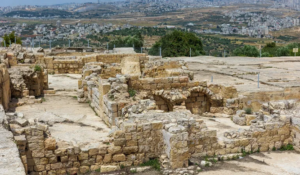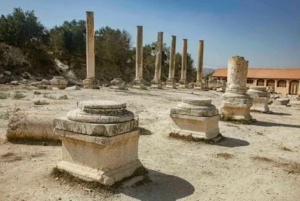For Israeli politicians, archaeology is a tool to prove Jews own this land

An archaeological dig near the West Bank village of Nabi Samwil.
Moshe Gilad writes in Haaretz on 17 February 2025:
The best-known lie in Israel is that the West Bank has not been part of the country since its capture in 1967. Instead, it has been under military rule, which is ostensibly temporary. After all, we’ll soon find a smart, mutually agreeable diplomatic solution and the West Bank will acquire a permanent status.
Thousands of ancient sites are scattered throughout the West Bank. They can be found in almost every Palestinian town or village. Some are in good shape and others in very bad condition.
The Israel Antiquities Authority has responsibility for archaeological digs and ancient sites in Israel. But the authority doesn’t operate in the West Bank. Responsibility for antiquities there is in the hands of the army’s Civil Administration. And the person responsible for archaeological digs, preserving antiquities and preventing damage to ancient sites is its chief archaeology officer.
For decades, this enterprise has seemingly run smoothly and quietly, under a thin blanket of separation between Israel and the West Bank, to enable international legitimacy. However, that lasted until MK Amit Halevi (Likud) arrived and threw a (virtual) hand grenade. And now, before our very eyes, this false calm has exploded.
Halevi is an educated man. He has a bachelor’s in history and political science from Bar-Ilan University and a master’s in public policy from Hebrew University. But this fundamental Israeli lie bothers him. So he came up with a different one. A bill sponsored by Halevi would give the Antiquities Authority power in the West Bank. The ostensible motive is his concern for the preservation of ancient sites. In other words, let’s replace the old lie with a new one.
One can easily conclude that Halevi knows his bill won’t be of any help to the field of archaeology. Neither a law nor a new administration will contribute to saving endangered archaeological sites in the West Bank. His move doesn’t stem from a desire to expand our knowledge of the Land of Israel’s ancient history, but from a desire to annex the West Bank and apply Israeli law to it.
Boom! Surprise! Halevi’s bill ran into strong opposition from everyone. Unusually for Israel, even the Antiquities Authority understood that this was a powerful land mine and objected vehemently. In a praiseworthy move, the authority refused to accept responsibility for supervising and managing archaeology in the West Bank.

The archaeological site at Sebastia
In a position paper submitted in late January, the authority said that “the bill as it stands is liable to do great damage to the Antiquities Authority’s – and Israel’s – academic ties with overseas players and to undermine their professional reputation.” In plain English, “spare us this headache.” Or, perhaps, “what was wrong with the lie we loved until now?”
Halevi’s bill would effectively mean annexing the occupied Palestinian territories. Nobody who is in contact with the Antiquities Authority – from wealthy donors to researchers around the world – would look kindly on this annexation.
In addition to the Antiquities Authority, the bill is opposed by all professional archaeologists as well as the Justice Ministry. Natalie Assaf of the ministry’s International Law Department said, “This legislation doesn’t jibe with Israel’s long-standing policy. The bill would likely bolster claims of steps toward annexation.”
Aside from the annexation that would be brought about through the back door, transferring responsibility for archaeological digs to the Antiquities Authority would brand all its researchers as part of the settlement enterprise. This would undermine the authority’s professional standing. And in the West Bank of 2025, between the settlers and the Palestinians, it would also apparently saddle it with an impossible mission.
Halevi hasn’t been deterred by opposition to the bill, and last week he proposed another brilliant idea – if the Antiquities Authority doesn’t want the job, then let’s establish a new administration to deal with antiquities in the West Bank that will be subject to the Heritage Ministry. This too, of course, would give a civilian Israeli agency power over the West Bank. Annexation is still annexation.
The bear hug between Israeli politics and archaeology has existed for decades – ever since the state was founded, and even before then. To Israeli politicians, archaeology was invented to prove that we own this land.
In recent decades, the settlers have also embraced archaeology – a fascinating field of study with great importance – as a tool for proving ownership and control. The most noteworthy examples are currently found in East Jerusalem’s City of David and the West Bank’s Shiloh and Sebastia, but they can easily be found in other places as well.
Three months ago, Sgt. Gur Kehati and researcher Ze’ev Erlich were killed in a clash with Hezbollah in Lebanon. The incident occurred at an ancient fortress. A military police investigation into the incident is still in process. But Erlich, one of the founders of the settlement of Ofra, has been known for years as someone who documents ancient sites in Arab villages in the West Bank. The army allowed him to visit these archaeological and historical sites, some of which were located in dangerous areas.
Erlich’s mission in life was to prove the Jews’ roots in the Land of Israel. Roots allow one to claim ownership. He engaged in archaeology (even though he wasn’t an archaeologist) because, with its help, he wanted to prove who owns the West Bank.
That he was honored by so many people shows how tempting this dangerous way of thinking is. Halevi’s repeated attempts to enshrine the desire for ownership of the past in law are no less dangerous than an unsecured entry into an ancient fortress in Lebanon.
This article is reproduced in its entirety
